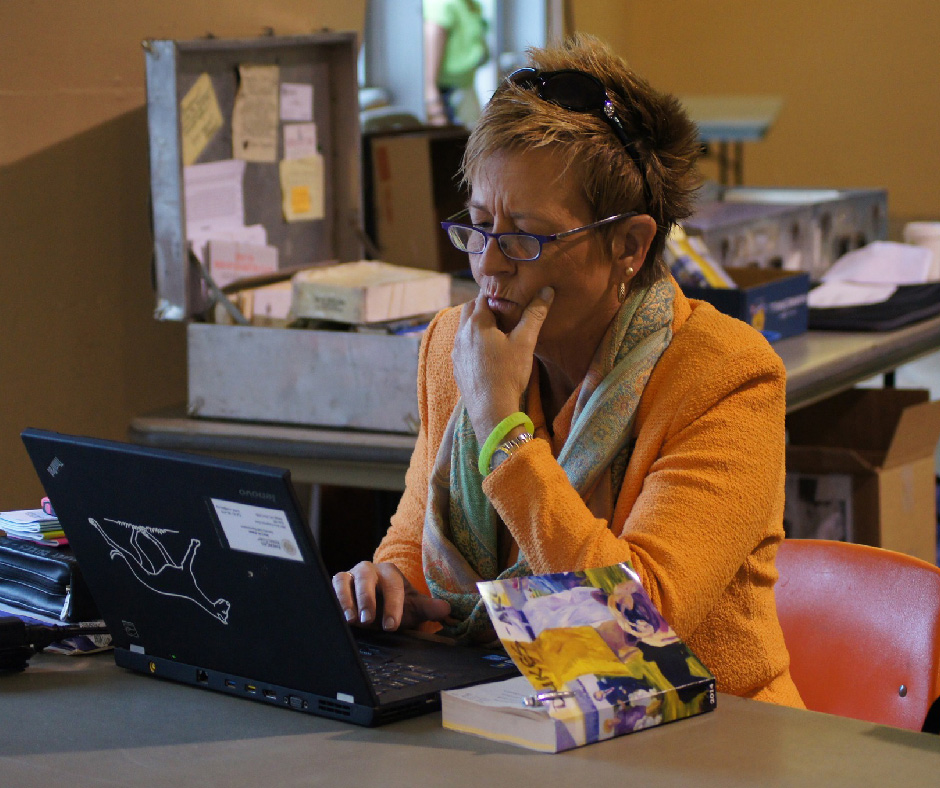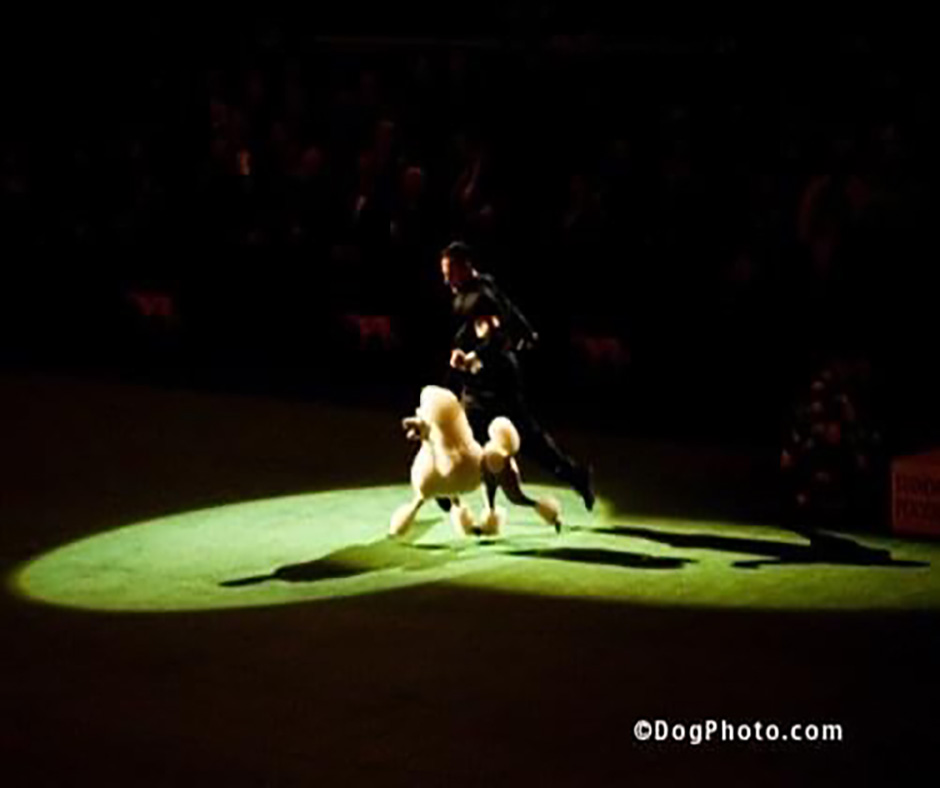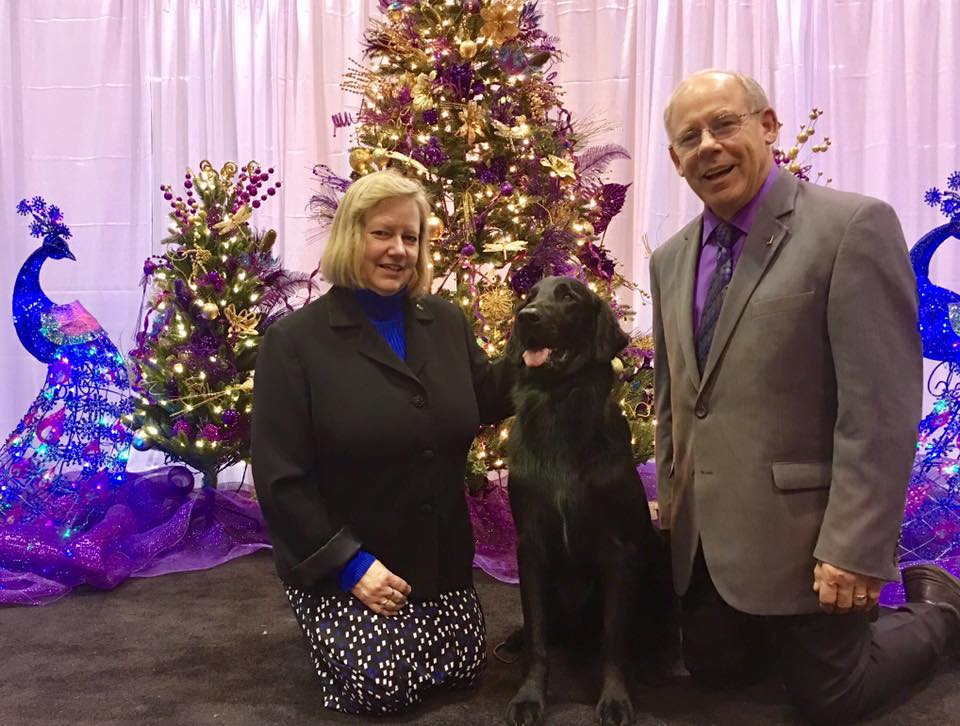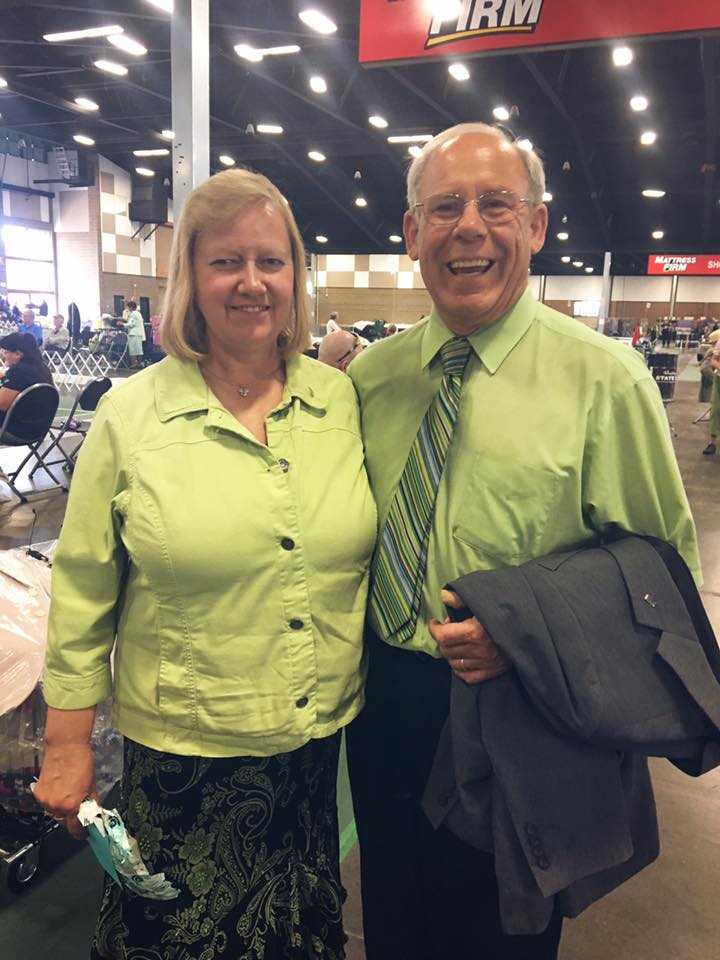616 – Mary Dukes: An Evolution from Owner to Professional to Rep to Judge
Mary Dukes: An Evolution from Owner to Professional to Rep to Judge
Host Laura Reeves is joined by Mary Dukes, legendary Whippet breeder, professional handler, AKC Executive Field Representative and now judge.
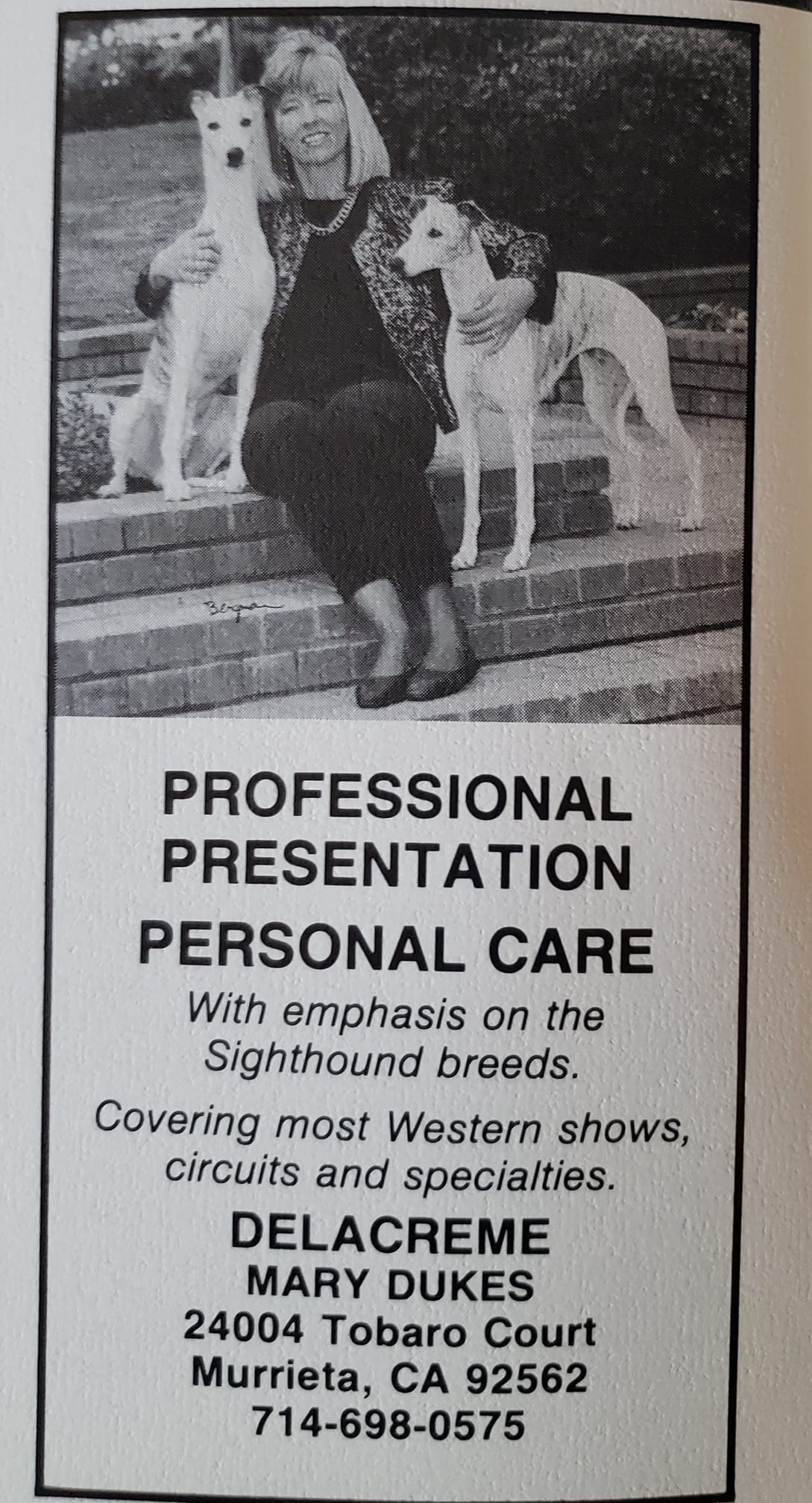
A 1991 advertisement for Dukes’ handling services.
Dukes has spent a lifetime involved in working with animals. From showing horses to training elephants to showing dogs. Her work with the zoo animals instilled in her an absolute dedication to animal husbandry.
NO Dirty Dogs
“There are no shortcuts in animal care. Period,” Dukes said. “In zoo animals, you have to be even more on top of it because wild animals don’t have a tell that they’re sick. In the wild, any tell that they are sick or injured is going to make them dead. So they are really good at masking that. If you are sloppy or dirty or messy there is no room for you in the animal business.
“I’ll put this on blast right now, if someone walks into my ring with a dirty dog, we’re going to have a problem. There is no excuse to show a dirty dog. I won’t hold it against the dog, but the handler might get an earful.”
AKC Registered Handler Program
Dukes was an early member of the AKC Registered Handler Program. As a rep, Dukes was a coordinator of the RHP. She joined RHP because they demanded insurance, inspections, so “I wanted to put my money where my mouth was.”
RHP is not a guarantee the handler is going to win with your dog, Dukes said.
“The whole point of the program is so the people have a place to start looking where we had done some of the ground work for you. You know they (they handlers) are insured. You know their vehicle is inspected for safety and cleanliness. You know their kennel has been inspected by AKC kennel inspectors. You know they’ve signed a code of ethics.
“RHP members have to have a contract. They have to bill in a timely fashion. The bill has to be itemized. A lot of the trouble you see, most of it is because the expectations weren’t clear. If you have a contract, it’s
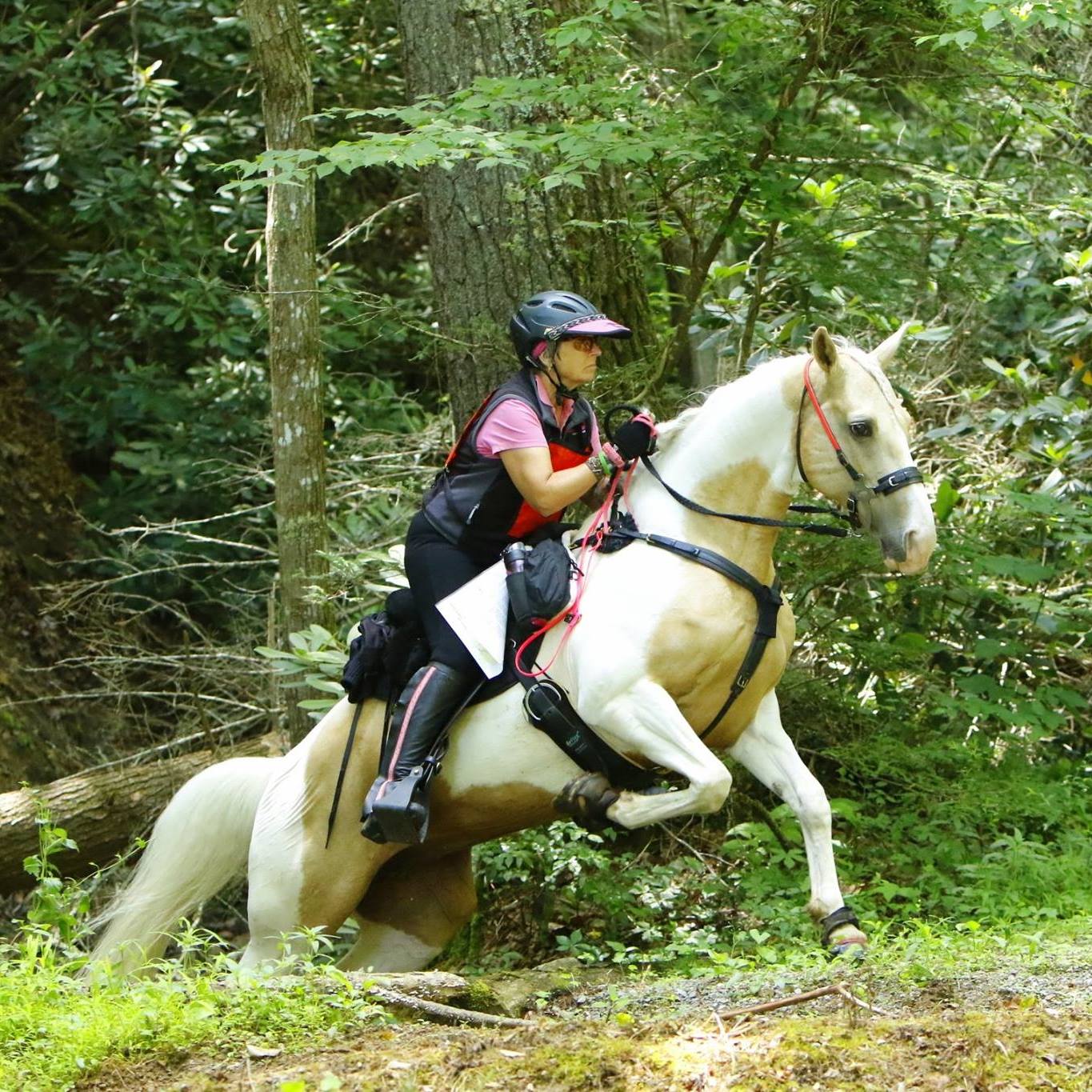
Dukes is still actively involved with horses. Her vacations frequently involve riding in exotic locales.
right there in black and white.
Safe Sport
“One of the newest requirements is SafeSport. All RHP members have to take the training as a condition of membership.
“Safe Sport is a congressionally mandated program for every Olympic sport.
“There’s been a lot of abuses in every sport. Basically, Safe Sport is making you aware of what to look for. If you see a situation that you suspect might be something, it gives you tools. Because we aren’t an Olympic sport, we don’t have access to the mechanics of the national organization.
“It automatically makes everyone (who’s had the training) mandatory reporters. If you put it out in the open more, it’s harder for someone to creep around. I would like to see it spread out to judges, especially juniors judges.”
Join us next week for part two of this fantastic conversation. Learn what Dukes is looking for in a dog and hear about her fantasy Best in Show lineup.
529 — Christian Manelopoulos: “I’m Going to America”
Christian Manelopoulos: “I’m Going to America”
Professional handler Christian Manelopoulos joins host Laura Reeves for part one of a wide-ranging conversation about professional handling, working as an apprentice, the toughest dogs to trim and the challenges of moving to America to begin his career.
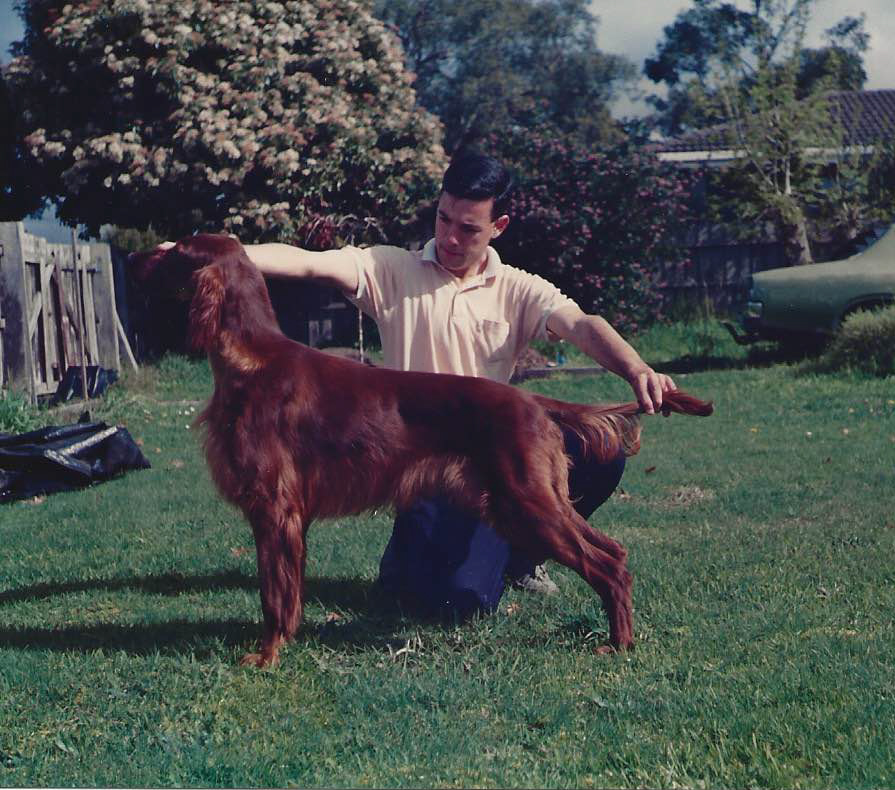
Christian with his first show dog, Taraglen Nicholas
Manelopoulos started in purebred dogs as a teenager in Australia after a knee injury ruined his cricket game. He eventually worked his way up to earning expense money showing dogs for the president of the Victorian Kennel Association.
But what he really wanted to do was move to the US and show dogs like the pictures he saw in Kennel Review of Frank Sabella’s poodles.
So, when he had a chance to work for Joe and Pauline Waterman in Southern California in the early 1990s, he jumped at the chance.
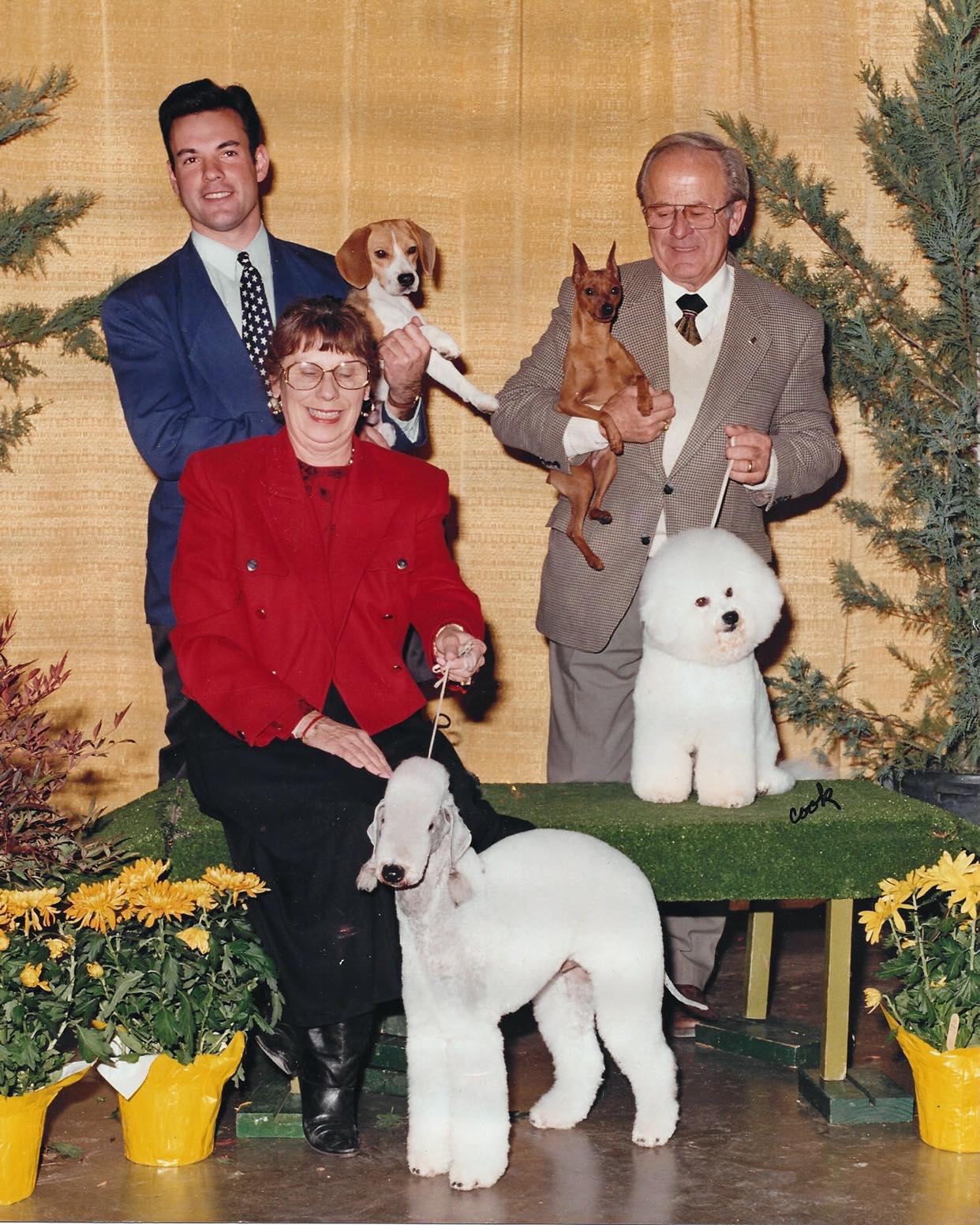
Christian in a team photo with Joe and Pauline Waterman during his apprenticeship.
“Going to Joe and Pauline was fantastic because being in Los Angeles, Dick Beauchamp and Frank Sabella would call the kennel. At that time (the Watermans) were still breeding Bichons a little bit. I would study the pedigrees of all the Bichons and all the dogs. I knew their pedigrees better than they did. I was so eager to learn at that time and so that was a tremendous experience.
“The dog show world in Los Angeles in the early ‘90s was a world of its own in that sense. Corky (Vroom) was like the king and then Bruce and Gretchen (Schultz), and then Joe, so it was a tremendous learning experience.
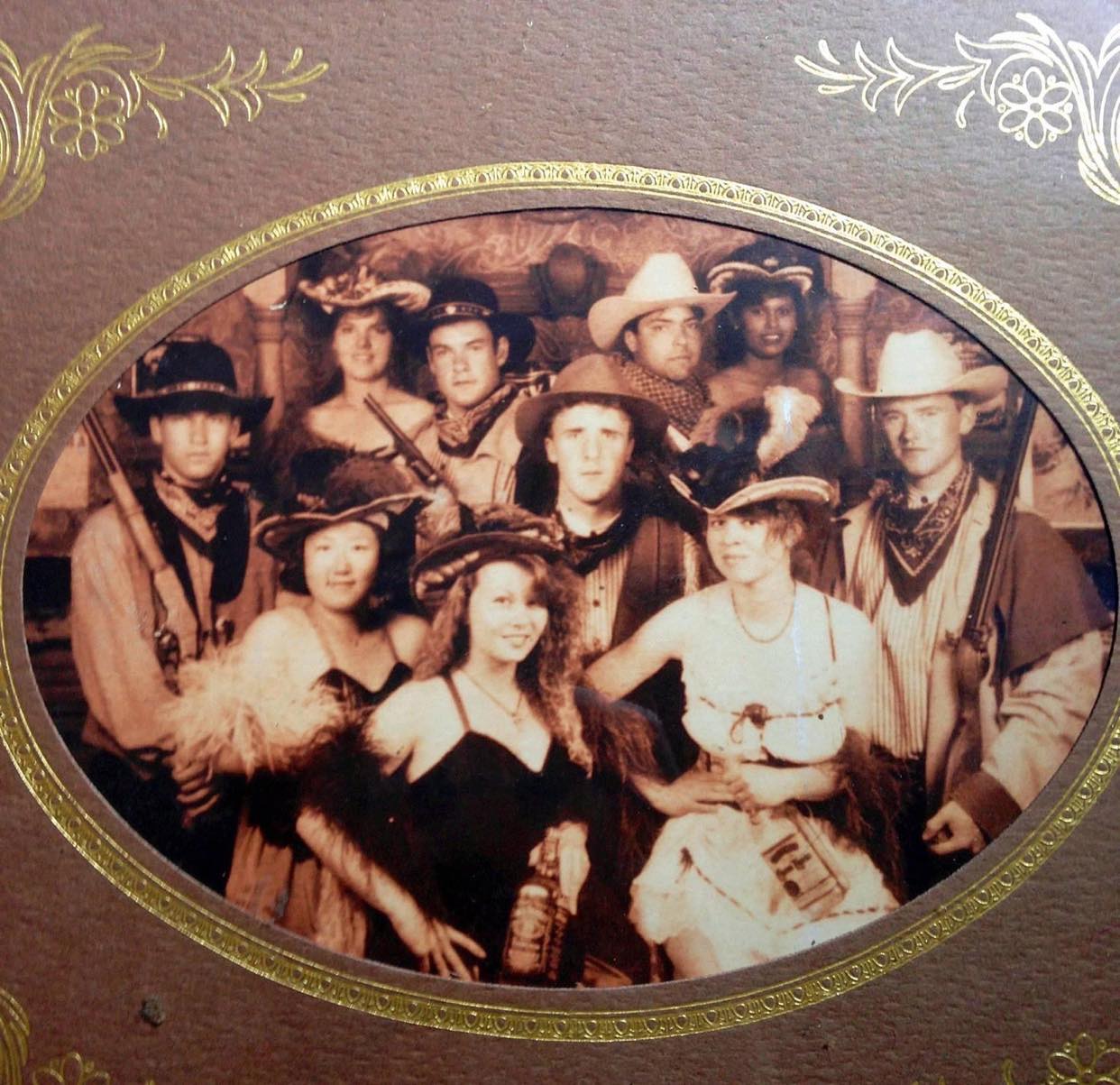
With other assistants in Los Angeles, Jason Hoke, Tracy Szaras, Andrew Peel, Doug Carlson, Jr Alacantara, Amy Thurow.
“I tell people it was different also because we didn’t have as many dog shows. Most of the shows were only Saturday and Sunday shows. So, all of the assistants, Woody’s assistants and Bruce and Gretchen’s and Corky’s, we would often get together on Tuesdays and go and do things. So it was a very communal thing.
“Pauline, Sue (Vroom), Gretchen and Bergit Coady, they were very motherly influences on a lot of the (dog show) kids in the LA area. Especially someone like me, I came from another country, my family was thousands of miles away, so in many ways these women replaced my parents for me. I’m very appreciative to all of them. Sadly most of them have passed away now, but it was definitely a different time.
“I groomed all the time. I mean, that’s the story of my life for 30 years. I tell people that I started working 15 hours a day and here I am 30 years later, I still work 15 hours a day. Everyday. It hasn’t changed.
“You’re very much an entrepreneur in this business. You’re self-employed, so the businesses is you. When you start out, you go out from being an assistant, you go out to become a handler, you’re literally saying ‘for the next 15 years of my life I am gonna work every waking minute of every day. I am going to forego going to people’s birthday parties and weddings and things like funerals and baby showers. I will regret many of those things.’
“But those are the compromises you make to be really successful. Now people can say ‘well, I want a work life balance.’ Those people either generally come from wealthy families or they’re not that successful. The most successful people, time and time again, that is their story. If you think it’s going to be different, then you should probably try something else, ’cause it’s not.
“You have to run it as a business. A lot of kids, they think ‘oh, I wanna get a big winning dog and then they travel around (in) a big truck, with a big mortgage for that truck, and make no money. They do some winning and then it’s all over. The most common issue dog handlers run into is tax issues. You’re self-employed, you don’t save enough money for taxes and things like that. Probably lesson number one I tell everybody get a great accountant.”
322 – The Winning Edge! Panel Discussion With the Masters
The Winning Edge! Panel Discussion With the Masters
Host Laura Reeves moderates a Friday Night Forum Panel Discussion on the topic of the “Winning Edge” with Judges Rick Gschwender and Pluis Davern and Professional Handler Bill McFadden.
It is not the judge’s job to find a “diamond in the rough,” Reeves posits. “Polish your “gem stone” for your best chance of success.”
Good habits
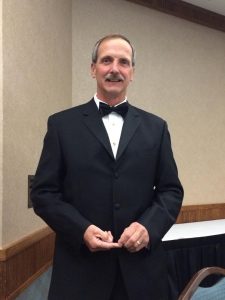 Gschwender starts the discussion by asking the audience about their habits with the dogs they exhibit.
Gschwender starts the discussion by asking the audience about their habits with the dogs they exhibit.
“How many of you train your dog? Road work him? Take video to see what the judge sees? Clean their teeth?” Gschwender queried. “I see people all the time, they’re paying $30 to enter the dog and haven’t even cleaned teeth.”
Gschwender adds, “Watch the judges. If you pay attention, you will see consistency in what they put up. You might not like it, but you will figure out what I like and come back and show that to me.”
Motivated by motion
Davern noted, in a fascinating observation, that people are *predators.* Which means “we are motivated by motion. What are judges looking at?” Davern asked rhetorically. “Motion. It catches the eye. You can *subtly* move your hand to show a pretty head, for example.
“You’re in the ring, you’re all showing the same “product.” There’s 20 boxes of cornflakes. What makes yours better than the others?”
Owner handlers have a huge advantage, Davern said. They are spending time with the dog they love.
“This is a great sport! Nobody takes a golf club to bed at night,” Davern said. “Life is not all about winning.”
Be prepared
“Take a deep breath and don’t rush,” McFadden advises. He also notes that in some cases, owner handlers who are long time breeders are “experts showing to novices.” Judges are life-long learners and may be new to a breed. “Present your breed the way it should be shown.”
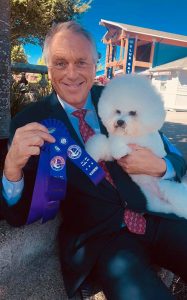 Most importantly, McFadden said, be prepared. “Make sure your dog is in condition, physically, mentally, emotionally.”
Most importantly, McFadden said, be prepared. “Make sure your dog is in condition, physically, mentally, emotionally.”
“You’ll have successes and failures you deserve and ones you don’t. It happens to handlers too. We show 20 dogs and might win with two,” McFadden added.
For more insight from a couple of these panelists, you can listen back to:
https://puredogtalk.com/10-bill-and-taffe-mcfadden-live-at-akc-nationals-wisdom-wednesday-2/
https://puredogtalk.com/34-sussex-spaniels-hunt-tests-search-and-rescue-pluis-davern-tells-all-2/
https://puredogtalk.com/35-dogs-to-the-rescue-firefighters-first-responders-and-pluis-davern-2/
123 – Hiring a Professional Dog Handler: Dinah Baggenstos – Professional Handlers Association
Hiring a Professional Dog Handler – Dinah Baggenstos and Laura Reeves
Hiring a professional show dog handler can sometimes feel like falling down the rabbit hole into a parallel universe complete with secret handshakes and special code words. We talk today with Dinah Baggenstos, president of the Professional Handlers Association, to help demystify the process.
When to Hire a Professional Handler
Making the decision to hire professional help in the show ring is one most exhibitors do not take lightly. After all, the center piece of the discussion is generally considered a four-legged family member not an “objet d’art.”
The intensely personal and emotional attachment to our pets makes sending them to “boot camp” or “on the road” a scary and daunting proposition. And it isn’t for everyone. But, for folks who simply don’t have the time, physical ability or inclination to show their dogs, talented professional handlers can make the experience at least painless, even enjoyable for everyone.
Choosing a Handler
Achieving that level of success requires trust and clear communication. Dinah strongly recommends observing the handler you are considering hiring, both in the ring and “behind the scenes.” Is the set up clean? Is it well organized and professional? Ask for references and tour kennel facilities and travel vehicles. Ask questions, read the contract and establish goals.
The AKC Registered Handler Program offers the following advice,
Before you hire a professional handler, talk to several, evaluate their rate schedules, visit their facilities and ask for references. Observe them both in and out of the ring. A professional handler is entrusted with your dog’s care, so make sure you are entirely comfortable with the arrangement. Make a point of meeting the people who work for the handler because they will be providing the daily care for your dog — under the guidance of the handler.
Handlers are expected to be hired for their knowledge and services they can provide. In turn the client is paying a fee for that handler’s service and expertise. You and your handler should have the terms of your agreement in writing. Make sure if you have any questions that they are answered before you commit yourself to a contract. Read the contract carefully — this will be a binding agreement between you and your handler.
American Kennel Club Criteria:
To be assured that your dog is being cared for by a true professional familiarize yourself with the following criteria as set forth by the American Kennel Club:
- Safety, security, and well-being of the dogs is to be placed above all other business considerations.
- Supervision of dogs by competent, conscientious personnel who are capable of responding appropriately, particularly in emergency situations.
- Facilities of proper size and adequate ventilation to accommodate the breeds being cared for at home and at the shows.
- Appropriate precautions taken to provide all the dogs in their care with proper temperatures for any and all conditions they may encounter.
- Adequate and proper diet, clean dishes, fresh water and a sanitary environment.
- Owner-provided or veterinary-prescribed medications to be administered in accordance with instructions.
- Breed specific knowledge concerning the breeds they show — such as: standard for the breed, special care, conditioning and presentation.
- Business relationships conducted with clients in a fair and honest manner based on a published rate schedule and handler/client agreement.
- Courteous verbal interchanges and a professional appearance are essential.
- Sportsmanlike behavior with clients, judges, exhibitors, fellow handlers and assistants.
- Willingness to communicate on a regular basis with clients concerning their dog’s performance, behavior and general health.”
Potential Handler Client Conflicts
Two of the most common areas of conflict in the handler-client relationship are changing representation and priority of dogs.
Both PHA and the AKC RHP code of ethics are very clear that handlers are not to solicit another handler’s clients, nor are they to take on another handler’s client if money is owed to the prior handler.
Dinah Baggenstos’ Recommendations
You have every right to go a different direction with your dog,” Dinah notes. “But make sure the bill is current with the existing handler. And understand if the dog is committed through a specific period of time it needs to stay with the handler for that time.”
Priorities and Expectations for the Client
Assigning priority of the dogs in a handler’s care in case of a ring conflict is one of the toughest parts of the job. While each handler manages these potential time crunches differently, part of the communication piece is to be sure clients understand up front where their dog fits in the handler’s priority. A good rule of thumb is that “specials” — champion dogs being campaigned for national ranking — will take priority over “class dogs” — non champion dogs earning points toward their championships.
As with any successful relationship, clearly understanding expectations and responsibilities between the parties is paramount. Although many incredible friendships are formed in long-time handler-client relations, it is first and foremost a business transaction.
“My expectation is that a client dog will be delivered to me in good condition, good health, clean teeth, nails and coat maintained,” Dinah notes. “The client should expect to have the dog returned in as good or better condition than when it arrived with the handler.”
“A handler needs to be honest with his or her clients as to the quality of dog being evaluated,” Dinah adds. “While clients owe respect to the handler for providing an honest and candid educated opinion.”
Importance of Clear Communication
On the topic of communication, once again, be sure the system whereby results are shared is established in advance.
Whether via text, phone call or whatever means, clients should keep in mind that the handler is taking care of their dogs. That does and should take priority over reporting results.
Listen to my talk with Dinah Baggenstos for more insights, suggestions and case studies.
Tip of the Week from Allison Foley: This is MY dance space, This is YOUR dance space
Your body posture and body language are directly reflected in your dog’s, Allison says. She reminds us, “If you walk like Eyore, your dog does the same thing.”
What’s your “happy” word? Allison uses kitty! She says it’s impossible to say “kitty, kitty, kitty” and not sound happy.
When stacking your dog, think about Patrick Swayze’s line to Jennifer Grey in the famous ‘80s film “Dirty Dancing.” Get out of your dog’s “space.”
Too often exhibitors are doing a great job stacking their dogs, but the judge can’t see it because the handler is “huddled” around the dog. Step back from your dog so the judge can see it!
Visit Leading Edge Show Dog Academy for courses and use PUREDOGTALK25 at check out for a 25% discount.

